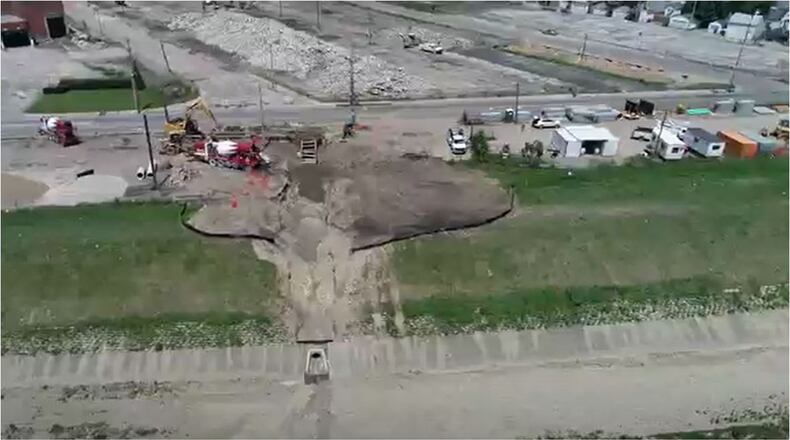Hamilton Director of Infrastructure Jim Logan said those closures were necessary to install a four-foot-wide storm sewer that will serve the property of the future Spooky Nook Sports Champion Mill. As part of that project, crews had to cut through the concrete flood levee so the pipe could lead to the Great Miami River.
Logan said he didn’t expect the bridge to be closed for at least another year. He said the closure was a major inconvenience for drivers, but was “absolutely necessary for us to get that storm sewer in, out of the way, and also maintain our distance with the contractors who are doing work at the site.”
Ford Development Co. is installing a new storm sewer from the area of Main and Lawn that will run northerly and tie into existing an storm sewer “to provide an outlet for the drainage at that intersection,” said city Director of Engineering Rich Engle.
“This will assist and provide some help to the Main-Lawn intersection,” Engle said.
Ford Development bid to perform the work for $758,000, and they expect to finish the work by Aug. 1.
That area of Main Street has experienced some severe flooding, including times when rain water swamped businesses on Main Street.
In 2016, severe flooding hit homes and the Main-Lawn area twice. The city successfully resolved the home basement-flooding problems that hit the Highland Park neighborhood on Hamilton’s West Side, and still are working on the Main-Lawn issue.
Logan said the sewer work will not fully fix flooding problems there.
“The new storm sewer on Main Street will provide minor improvement to the drainage issues at the Main Street/Lawn Avenue intersection,” Logan said. “The new storm sewer will redirect the drainage from the intersection itself northerly to Two Mile Creek.”
Logan said city staff, in figuring out how to completely solve the flooding issues in that area, are evaluating a variety of possible storm sewer improvements and developing a prioritized Capital Improvement Plan.
As a way to finance such improvements, the city council in late 2018 voted to increase what was a monthly fee of $3.60 for a typical homeowner at that time. The fee climbed by 70 cents per month to $4.30 in 2019 and another 70 cents this year to $5 per month. That was the first time the city increased the storm-water charges since they were created in 2001.
About the Author
